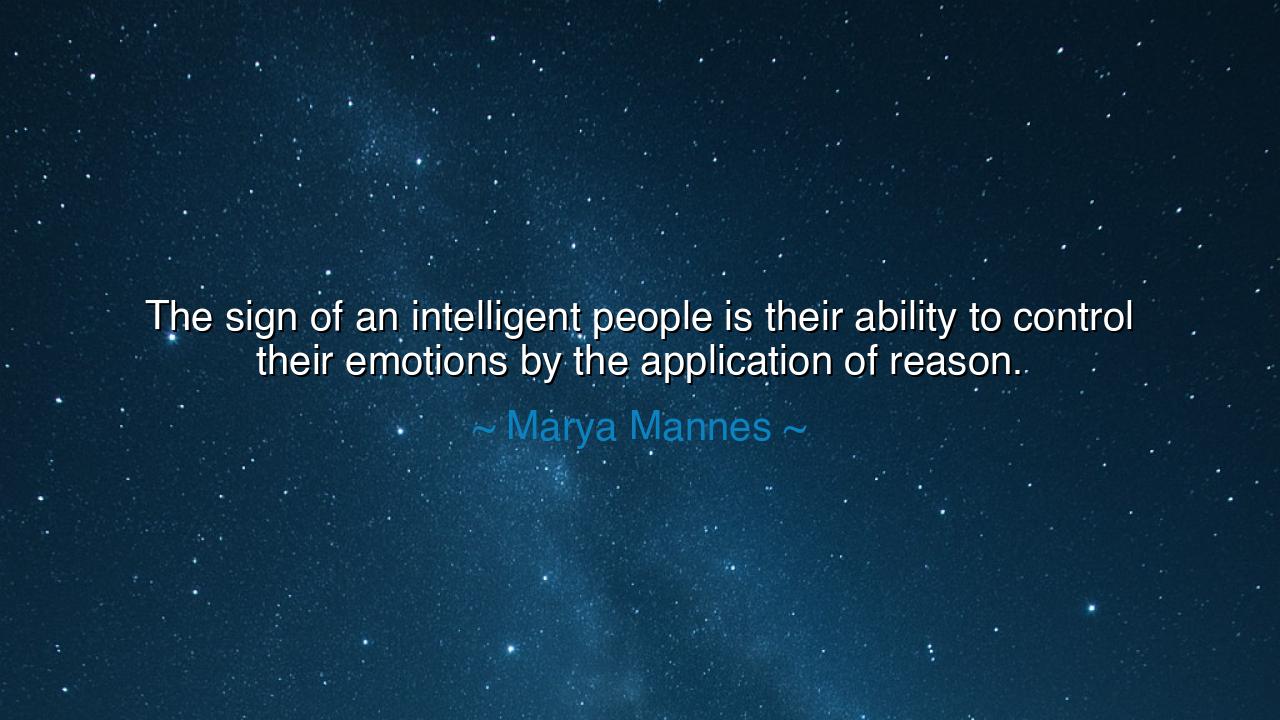
The sign of an intelligent people is their ability to control
The sign of an intelligent people is their ability to control their emotions by the application of reason.






“The sign of an intelligent people is their ability to control their emotions by the application of reason.” So declared Marya Mannes, a voice both sharp and luminous, who lived in an age of conflict and awakening. Her words carry the weight of ancient wisdom dressed in modern thought, for they echo a truth as old as the first philosophers: that reason is the crown of the human spirit, and emotion, though divine in its energy, must be guided lest it devour its master. Intelligence is not merely the possession of knowledge—it is the art of self-command, the discipline to choose serenity over fury, and understanding over impulse.
The ancients would have nodded in agreement. The sages of Greece taught that to govern others one must first govern oneself. In the schools of Athens, it was said that passion is like a chariot drawn by wild horses—the charioteer must hold the reins firmly, or else be dragged into ruin. For emotion is not evil; it is power—pure, raw, and sacred—but without reason, it burns without purpose, consuming instead of illuminating. The intelligent person is not one who feels nothing, but one who feels deeply and still remains master of the storm within.
Consider the story of Marcus Aurelius, emperor of Rome and philosopher of endurance. Surrounded by betrayal, burdened by plague and war, he did not curse the heavens nor sink into despair. Each morning he wrote to himself, reminding his own heart that the universe follows its nature, and that to live rightly one must meet chaos with reasoned calm. “You have power over your mind,” he said, “not outside events.” Thus he reigned not by sword alone, but by mastery of self. His rule endures in memory not because of conquest, but because he embodied what Mannes foretold: that intelligence shines brightest when emotion bends before reason.
Yet the modern world has forgotten much of this. We live in an age where emotion is exalted above all, where outrage passes for conviction, and passion masquerades as truth. Many confuse reaction with strength, and mistake loudness for wisdom. But he who cannot master his own anger becomes its servant; she who lets grief govern her decisions is ruled by ghosts. The intelligent soul does not suppress emotion—it listens, understands, and then chooses. For every feeling, however fierce, is but a messenger; it speaks, but it must not dictate.
This balance between reason and emotion is the mark of true civilization. A people who think before striking, who temper desire with discernment, and who rise above vengeance—these are the builders of lasting peace. History shows that nations fall when passion consumes prudence. The fall of Athens came not through ignorance, but through pride and fury; the fall of Rome, through excess and indulgence. Intelligence, whether in man or in nation, lies not in knowledge amassed but in wisdom applied—the wisdom to act rightly when the heart trembles and the world provokes.
Yet let it not be thought that reason is cold. The truly wise heart is not stone—it feels love, sorrow, anger, and joy, yet holds them in harmony. Just as a river gains strength by its banks, so too emotion gains purity when shaped by understanding. The fire of passion can warm or destroy; the difference lies in control. To reason is not to kill the flame, but to shape it into light. Thus, the intelligent person walks the middle path—fierce in spirit, gentle in judgment, and calm in the face of storm.
So, my child of thought and feeling, remember this: intelligence is not measured by how much you know, but by how you govern what you feel. When anger rises, pause. When fear speaks, listen, but do not kneel. When sorrow weighs upon you, let reason lift it into meaning. Learn to think before you act, to breathe before you speak, and to reflect before you decide.
For the truest sign of intelligence is not brilliance of mind, but mastery of soul. The wise do not flee their emotions—they command them, like a seasoned sailor steering through waves. Let reason be your compass and emotion your wind. Together, they will carry you not to ruin, but to greatness.






AAdministratorAdministrator
Welcome, honored guests. Please leave a comment, we will respond soon